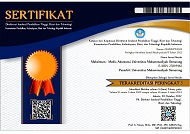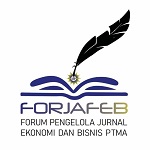Financial Synergy for Sustainable Success: Optimizing Management, Investment, AI, and Risk SMEs in Bali
(1) Universitas Pendidikan Nasional
(2) Universitas Pendidikan Nasional
(*) Corresponding Author
Abstract
In the context of globalized and environmentally conscious business landscapes, this study investigates the intricate relationships between investment decisions, risk perception, artificial intelligence (AI), and sustainable success in small and medium enterprises (SMEs) in Bali. Employing a quantitative approach, the research explores the mediating role of investment decisions using theoretical frameworks such as the Triple Bottom Line, Pecking Order Theory, Trade-Off Theory, and Prospect Theory. Results from a sample of 150 SMEs reveal significant direct effects and correlations, with investment decisions mediating between AI, risk perception, and sustainability. Managerial implications emphasize strategic AI integration, robust risk management, and a balanced approach to investment decisions for sustainable success. While limitations include sample size constraints, future research directions suggest longitudinal and qualitative studies, exploration of sectoral variations, and assessing the impact of emerging technologies on sustainability decisions. This study provides actionable insights for companies navigating the complexities of sustainable decision-making and underscores the imperative for businesses to foster a culture of adaptability and innovation. By embracing these insights and cultivating a forward-thinking approach, companies can not only optimize their current sustainability strategies but also position themselves strategically to thrive in an ever-evolving business landscape.
Keywords
Full Text:
PDFReferences
Batisha, A. (2023). A lighthouse to future opportunities for sustainable water provided by intelligent water hackathons in the Arabsphere. Humanities and Social Sciences Communications, 10(1), 1–13. https://doi.org/10.1057/s41599-023-02146-3
Briozzo, A., Vigier, H., & Martinez, L. B. (2016). Firm-Level Determinants of the Financing Decisions of Small and Medium Enterprises: Evidence from Argentina. Latin American Business Review, 17(3), 245–268.
Chaudhary, G. (2023). Environmental Sustainability: Can Artificial Intelligence be an Enabler for SDGs? Nature Environment and Pollution Technology, 22(3), 1411–1420. https://doi.org/10.46488/NEPT.2023.v22i03.027
Cuadrado, E., Molero-Jarilla, E. M., Muñoz-García, I. M., Torres-Porras, J., & Alcántara-Manzanares, J. (2024). Design and validation of the perception of risk towards environmental unsustainability scale (PREUS). Environment, Development and Sustainability, 0123456789. https://doi.org/10.1007/s10668-024-04931-9
Cubas-Díaz, M., & Martínez Sedano, M. Á. (2018). Measures for Sustainable Investment Decisions and Business Strategy – A Triple Bottom Line Approach. Business Strategy and the Environment, 27(1), 16–38. https://doi.org/10.1002/bse.1980
Dung, N. T. P., Anh, N. T. M., Toan, P. H., Hieu, L. T., Linh, N. T., & Hang, H. T. (2024). The impact of environmental, social, and governance information on individual stock investment decisions. Risk Governance and Control: Financial Markets and Institutions, 14(2), 32–43. https://doi.org/10.22495/rgcv14i2p4
Eleftheriou, K., Nijkamp, P., & Polemis, M. L. (2024). Club convergence of sustainable development: fresh evidence from developing and developed countries. Economic Change and Restructuring, 57(2). https://doi.org/10.1007/s10644-024-09617-w
Foerstl, K., Azadegan, A., Leppelt, T., & Hartmann, E. (2015). Drivers of Supplier Sustainability: Moving Beyond Compliance to Commitment. Journal of Supply Chain Management, 51(1), 67–92. https://doi.org/10.1111/jscm.12067
Gimenez, C., Sierra, V., & Rodon, J. (2012). Sustainable Operations: Their Impact on The Triple Bbottom Line. International Journal of Production Economics, 140(1), 149–159.
Gveroski, M., & Jankuloska, A. R. (2017). Determinants of Investment Decisions in Smes. Balkan and Near Eastern Journal of Social Sciences Balkan Ve, 3(1), 71–78.
He, W., & Kyaw, N. A. (2018). Finance and Economics. Research in International Business and Finance, 43, 48–57.
Henry, P., & Krishna, D. (n.d.). Making the investment decision process more naturally intelligent How AI technologies are improving man-machine communication with natural language processing.
Huang, A. H., & You, H. (2023). Artificial intelligence in financial decision-making. Handbook of Financial Decision Making, 2, 315–335. https://doi.org/10.4337/9781802204179.00029
Jo, H., & Baek, E. M. (2023). Customization, loneliness, and optimism: drivers of intelligent personal assistant continuance intention during COVID-19. Humanities and Social Sciences Communications, 10(1). https://doi.org/10.1057/s41599-023-02021-1
Khan, I. S., Ahmad, M. O., & Majava, J. (2021). Industry 4.0 and sustainable development: A systematic mapping of triple bottom line, Circular Economy and Sustainable Business Models perspectives. Journal of Cleaner Production, 297, 126655. https://doi.org/10.1016/j.jclepro.2021.126655
Kurniawati, R., Suparlinah, I., & Farida, Y. N. (2022). The effect of investment understanding, risk perception, income, and investment experience on investment behavior on capital market investors in Klaten District. Fair Value: Jurnal Ilmiah Akuntansi Dan Keuangan, 4(9), 3995–4004. https://doi.org/10.32670/fairvalue.v4i9.1581
Menicucci, E., Paolucci, G., Menicucci, E., & Paolucci, G. (2016). The Determinants of Bank Profitability : Empirical Evidence from European Eanking Sector. Journal of Financial Reporting and Accounting, 14(1), 86–115.
Mulyadi, M., Zulkifli, Z., & Widyastuti, T. (2023). Analysis of Factors Affecting Investment Decisions and its Implications on Organizational Performance. Interdiciplinary Journal and Hummanity (INJURITY), 2(9), 784–794. https://doi.org/10.58631/injurity.v2i9.111
Ogata, H., Flanagan, B., Takami, K., Dai, Y., Nakamoto, R., & Takii, K. (2024). EXAIT: Educational eXplainable Artificial Intelligent Tools for personalized learning. Research and Practice in Technology Enhanced Learning, 19, 1–30. https://doi.org/10.58459/rptel.2024.19019
P, Dr. Sindhu K., Kumar, D. S., & Rajitha. (2014). Influence of Risk Perception of Investors on Investment Decisions. Journal of Finance and Accounting, 2(2), 15–25.
Paz, T. da S. R., Caiado, R. G. G., Quelhas, O. L. G., Gavião, L. O., & Lima, G. B. A. (2021). Assessment of sustainable development through a multi-criteria approach: Application in brazilian municipalities. Journal of Environmental Management, 282(January). https://doi.org/10.1016/j.jenvman.2021.111954
Peprah, W. K., & Ayaa, M. M. (2022). The Convergence of Financial Decision, Business Strategy Through Organisational Competitiveness to Sustainable Competitive Advantage: A Conceptual Analysis. International Journal of Economics and Finance, 14(2), 87.
Rahyuda, I. K., Purbawangsa, I. B. A., & Surya, I. B. K. (2019). Relationship Between Competitive SMEs’ Orientation and “Catur Paramitha.” International Journal of Social Economics, 46(7), 861–873.
Rashid, A., & Saeed, M. (2017). Firm’s Investment Decisions-Explaining The Role of Uncertainty. Journal of Economic Studies, 1–34.
Rashid, K., Tariq, Y. Bin, & Rehman, M. U. (2022). Behavioural errors and stock market investment decisions: recent evidence from Pakistan. Asian Journal of Accounting Research, 7(2), 129–145. https://doi.org/10.1108/AJAR-07-2020-0065
Ravan Ramzani, S., Konhaeusner, P., Olaniregun, O. A., Abu-Alkheil, A., & Alsharari, N. (2024). Integrating AI-Driven Green Finance Strategies for Sustainable Development: A Comparative Analysis of Renewable Energy Investments in Germany and Denmark. European Journal of Business and Management Research, 9(2), 43–55. https://doi.org/10.24018/ejbmr.2024.9.2.2277
Sabri, M. F., Anthony, M., Law, S. H., Rahim, H. A., Burhan, N. A. S., & Ithnin, M. (2023). Impact of financial behaviour on financial well-being: evidence among young adults in Malaysia. Journal of Financial Services Marketing, 0123456789. https://doi.org/10.1057/s41264-023-00234-8
Sarker, I. H. (2023). Machine Learning for Intelligent Data Analysis and Automation in Cybersecurity: Current and Future Prospects. Annals of Data Science, 10(6), 1473–1498. https://doi.org/10.1007/s40745-022-00444-2
Shahid, M. S., & Abbas, M. (2019). Does corporate governance play any role in investor confidence, corporate investment decisions relationship? Evidence from Pakistan and India. Journal of Economics and Business, 105(March), 105839. https://doi.org/10.1016/j.jeconbus.2019.03.003
Shahwan, Y. (2018). The Mediating Effect of Investment Decisions and Financing Decisions on The Influence of Capital Structure Against Corporate Performance: Evidence From Jordanian Listed Commercial Banks. Academy of Accounting and Financial Studies Journal, 22(6).
Sheikh, J., Shakeel Ahmed, W., Iqbal, W., & Tahir Masood, M. (2012). Pecking at Pecking Order Theory: Evidence from Pakistan’s Non-financial Sector. Journal of Competitiveness, 4(4), 86–95.
Su, F., Song, N., Shang, H., Wang, J., & Xue, B. (2021). Effects of social capital, risk perception and awareness on environmental protection behavior. Ecosystem Health and Sustainability, 7(1). https://doi.org/10.1080/20964129.2021.1942996
Terraza, V., İpek, A. B., & Rounaghi, M. M. (2024). The Nexus Between the Volatility of Bitcoin, Gold, and American Stock Markets during the COVID-19 Pandemic: Evidence from VAR-DCC-EGARCH and ANN Models.
Waheed, A., & Malik, Q. A. (2019). Board Characteristics, Ownership Concentration and Firms ’ Performance A Contingent Theoretical Based Approach. South Asian Journal of Business Studies, 8(2), 146–165.
Wang, A., Kresta, A., & Tichý, T. (2024). Evaluation of strategy portfolios. Computational Management Science, 21(1). https://doi.org/10.1007/s10287-023-00497-5
Wang, J., Wang, S., Lv, M., & Jiang, H. (2024). Forecasting VaR and ES by using deep quantile regression, GANs-based scenario generation, and heterogeneous market hypothesis. Financial Innovation, 10(1). https://doi.org/10.1186/s40854-023-00564-5
Wang, Y. (2024). The impact of AI on the Green Economy: Driving Sustainability Through AI (Issue Icemci). Atlantis Press International BV. https://doi.org/10.2991/978-94-6463-368-9_83
Wu, J. (2024). Role of green finance and carbon accounting in achieving sustainability. Humanities and Social Sciences Communications, 11(1), 1–7. https://doi.org/10.1057/s41599-023-02492-2
Xu, A., & Zhang, J. (2024). Utilizing virtual arts in reforming market players’ behavior to invest in sustainability projects. Humanities and Social Sciences Communications, 11(1). https://doi.org/10.1057/s41599-024-02750-x
Yang, F., Tan, J., & Peng, L. (2020). The effect of risk perception on the willingness to purchase hazard insurance—A case study in the Three Gorges Reservoir region, China. International Journal of Disaster Risk Reduction, 45(November 2019). https://doi.org/10.1016/j.ijdrr.2019.101379
Zhao, Z., & Xing, Z. (2024). Corporate management, green finance, and sustainability. Humanities and Social Sciences Communications, 11(1), 1–8. https://doi.org/10.1057/s41599-023-02490-4
Article Metrics
Abstract view : 184 timesPDF - 5 times
DOI: https://doi.org/10.26714/mki.14.2.2024.204-219
Refbacks
- There are currently no refbacks.
-----------------------------------------------------------------------------------------------------------------------------------------------------------------------------------
 | MAKSIMUM: Media Akuntansi Universitas Muhammadiyah Semarang |
![]()
Maksimum: Media Akuntansi Universitas Muhammadiyah Semarang is licensed under a Creative Commons Attribution Attribution-NonCommercial-NoDerivatives 4.0 International License.

















